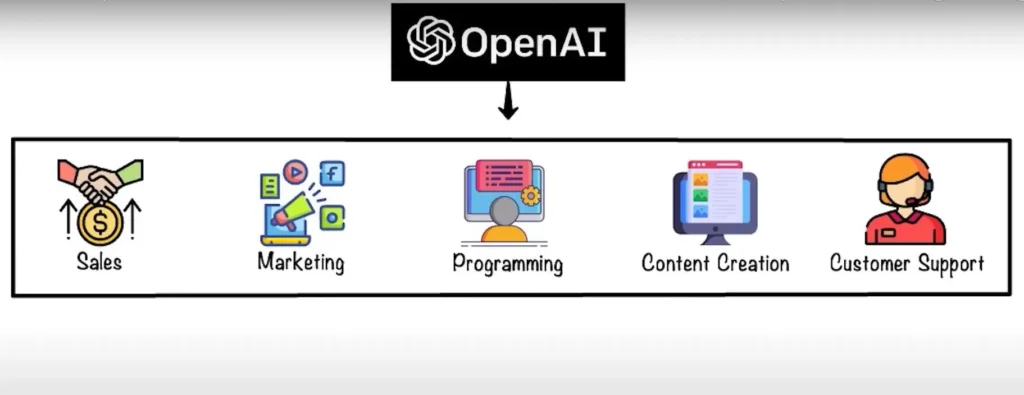The term ChatGPT has been all over many countries’ news feeds lately. Have you encountered it too, and if so, have you wondered what this new trend is? Actually, ChatGPT is just an extension of the broader fascination with neural networks; the distinction is that this AI is renowned for its ability to process data rather than visuals.
What is ChatGPT, then? In what way is it useful? Can the services we’re used to be replaced by it? Let’s investigate this further.
Describe ChatGPT
The OpenAI team’s ChatGPT appears to a typical user to be a standard messenger chat where you can ask any questions and receive text responses in response.
Although the “communication” process may give the impression that you are speaking with a real person, the other end of the chat is actually a chatbot using artificial intelligence. This bot searches through all of the data it currently has when you type and submit a question, using that data to provide an answer.
Maybe the best way to describe ChatGPT is as an extremely intelligent individual with opinions on nearly any topic. Strangely, the bot attempts to construct sentences as precisely and correctly as it can, making its responses appear to be written by a live, literate person.
Why is it so well-liked?
Most queries can be answered with ChatGPT instead of traditional search engines like Yandex or Google. The bot is capable of providing answers to nearly all basic and moderately complex queries; the more data it has been fed about a particular subject, the more precise its responses will be. This removes the necessity of searching through endless amounts of content and advertisements on a search engine to find the solution.
But this is not the only factor contributing to ChatGPT’s success. Neural network technology has already been put to good use by creative users: students use the bot’s responses to create essays, programmers ask it to write code, and attackers have already begun using it to create trojans and viruses. Media reports about schools around the globe being worried about the ChatGPT craze or even preventing their students from accessing the bot are becoming more and more common.
How can I use ChatGPT?

Go to this link to begin using ChatGPT. A prompt to log in or register will appear; you can use your Google account or create an account by creating a username and password. The service requests that you input and validate your phone number when completing the registration process.
Many types of questions, including household, mathematical, biological, historical, and so forth, can be sent in. Most of the time, you will receive a thorough, knowledgeable, and fairly accurate response.
What needs to be considered?
The user is cautioned by the project team about various subtleties of interacting with ChatGPT after registering.
- The bot first stores every conversation. This is required to evaluate its output and enhance communication with it. Thus, avoid disclosing personal information in chat.
- Secondly, the developers advise against depending on the chatbot for important questions because the responses could be phony or erroneous. More on accuracy will be covered below. You are strongly advised by the OpenAI team not to heed the advice of this neural network.
- Third, the chatbot might produce replies that aren’t offensive, racist, or politically correct. Given that it is a neural network rather than a human, you might encounter its “understudy” in situations and domains that appear basic to you.
- Fourth, since the bot is still in beta, any issues should not come as a surprise or annoyance.
How about correctness?

One thing you should be aware of when you ask a question on ChatGPT is that the bot is not online. In other words, it is unable to “google” the solution to your query rapidly. The database that was “fed” to the bot by the developers is the only one it uses for communication. This has a number of effects.
- To start, the data might be dated. Our world is incredibly dynamic, and nearly all information is updated and added to on a daily basis. However, the bot won’t get those updates until the vendors themselves give it a new batch of data.
- Secondly, the data might be lacking. If your question is extremely obscure or goes beyond commonly asked topics, ChatGPT might not be able to provide the information you need, or it might have inaccurate information that was gathered “along the way,” indirectly, in addition to the main array.
- Third, new information is omitted. Since the bot’s base is currently restricted to the year 2021 inclusive, it appears that the developers have not yet set themselves the goal of continuously updating the information that the bot has. That is to say, it just does not know about many of the events that have occurred in the past few days or months, so it cannot tell you about them.
And what about the money?
Currently, ChatGPT can be used for free. The CEO of OpenAI stated that although developing and maintaining such a sophisticated system costs a lot of money, up until now it has been possible to do so without charging customers. Simultaneously, he provided an honest warning that eventually ChatGPT will need to be paid for.
Will Yandex, Google and other traditional search engines be supplanted by ChatGPT?

It appears that it is too soon to say. Without a doubt, ChatGPT is an incredibly potent technology capable of a plethora of tasks. It does, however, have certain restrictions.
The neural network cannot obtain real-time information since it is not connected to the internet. We tend to search for current information rather than historical information, so ChatGPT is still useless in this regard.
Furthermore, this neural network performs tasks that are better left to itself rather than being done by you. Information sorting is what I mean. It is not the same to search, compare, and choose data in a search engine as it is to receive one ready-made, alternative-free option from an AI. In certain situations, manual search is not essential, and ChatGPT performs an excellent job in this regard. However, you shouldn’t yet depend solely on neural networks to locate the right information, tell fact from fiction, or identify irony or fakes.
Will neural networks replace humans in the workplace?
There are several grounds for thinking ChatGPT will outperform a human at some tasks. However, there isn’t much of this kind of work to date. It is still very early to talk about “human replacement” in mental work, because human analytics and brainstorming are necessary for the great majority of work processes.
Smartphone auto-replacement is a prime example. The device will not be able to respond to messages on your behalf, even after several years of use. Most of the time, the words that the self-learning keyboard suggests are not appropriate to use as “next”.
The conclusion is rather straightforward
AI is currently a fantastic helper, but nothing more. In summary, there’s a reason why ChatGPT has gained such a large following. Even if we ignore its practical value, you can’t help but be astounded by the neural network’s ability to provide precise, fluid, and knowledgeable responses whenever you ask a question in chat. This service can and should be tried as long as it is free. It can be helpful for practically anyone, in my opinion. Remembering that it is only “hardware” is crucial.